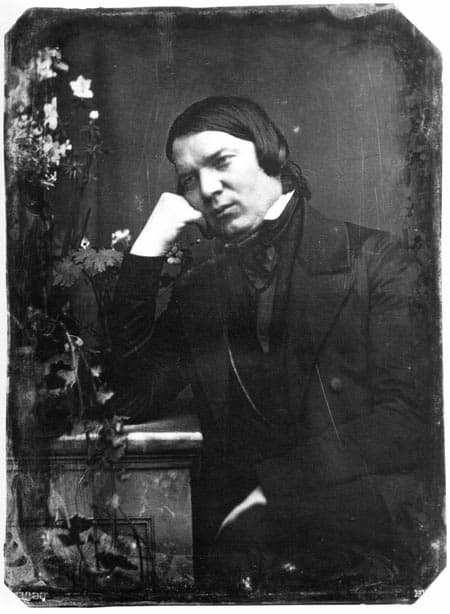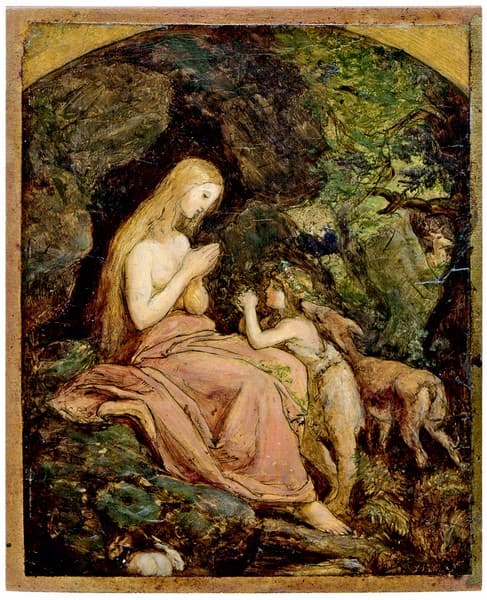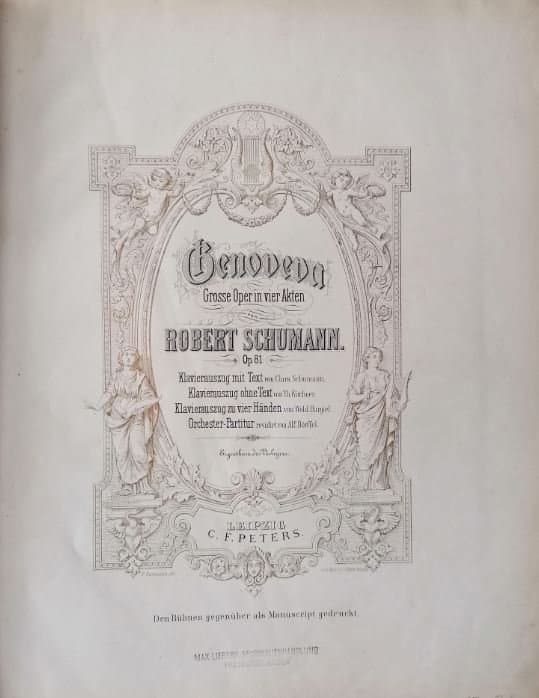Premiered at the Stadtteater in Leipzig on 25 June 1850, Robert Schumann’s (1810-1856) four-act opera Genoveva elicited a strong response from Richard Wagner. “Schumann is a strange man,” he writes, “who has no sense of melody, and his opera Genoveva showed errors in conceptual design.”

Robert Schumann, 1850
Schumann conducted the first two performances, and the next production took place in Weimar in April 1855. Liszt conducted that performance and he quickly saw the merits and weaknesses of the work. As he wrote to Anton Rubinstein, “I must leave you now to go to rehearse Schumann’s Genoveva. Of the operas that have been produced over the last 50 years it is certainly the one I prefer (Wagner excepted – that is understood), in spite of its lack of dramatic vitality.” That lack of dramatic vitality has been attributed to the author of the libretto, which turned out to be none other than Schumann himself.
Robert Schumann: Genoveva, Op. 81 “Overture”
Schuman had devoted his formative years primarily to literature. Already at the age of 13, he had published articles, written large anthologies of poetry, a five-act tragedy, and translated many Latin works into German. He even tried his hands at writing novels and dramas. He became acquainted with the medieval legend “Genoveva” through Ludwig Tieck’s dramatized fairy tale, and he commissioned the poet Robert Reinick to write a libretto based on Tieck’s play. When Reinick had completed almost half the libretto, Schumann discovered Friedrich Hebbel’s play “Genoveva” and asked Reinick to rewrite the libretto by fusing both literary sources.

Friedrich Hebbel’s play “Genoveva”
“While Tieck focused on the legendary character of the Genoveva subject in a broadly designed historical picture orientated towards Shakespearian dramatic construction, Hebbel excluded all aspects relating to the story of the saint. Instead, he concentrated on the explosive psychology of Genoveva’s antagonist Golo, whose development into a diabolical criminal is displayed with pitiless realism.” Reinick did write a second draft rejected by Schumann, and the composer subsequently approached Hebbel, who, like subsequently Reinick, wanted nothing to do with the libretto.
Robert Schumann: Genoveva, Op. 81 – Act II: Scene: O weh des Scheidens, das er tat! … Fullt die Becher bis zum Rande … Ihr seid es, Golo? (Ruth Ziesak, soprano; Deon van der Walt, tenor; Arnold Schoenberg Choir; Chamber Orchestra of Europe; Nikolaus Harnoncourt, cond.)
Robert Schumann: Genoveva, Op. 81 – Act II: Finale: Sacht, sacht, aufgemacht! (Ruth Ziesak, soprano; Deon van der Walt, tenor; Marjana Lipovšek, mezzo-soprano; Hiroyuki Ijichi, bass; Arnold Schoenberg Choir; Chamber Orchestra of Europe; Nikolaus Harnoncourt, cond.)

August Leopold Venus: Genoveva with her son
The opera is set in the 8th century, and Charles Martel, the leader of the Franks rallies Christian armies to counter the advance of the Moors from Spain to France. The Bishop of Trier (baritone) summons Christian warriors to join the crusade, and Siegfried, Count Palatine (baritone), assembles his army. Before departing, he entrusts his castle, and the care of his new young wife, Genoveva (soprano), to a trusted friend, the young knight Golo (tenor). We soon learn that Golo is desperately in love with Genoveva and he enlists his sorceress foster-mother, Margaretha (soprano) to win Genoveva. Genoveva rejects Golo, eventually calling him a dishonorable bastard. Now bent for vengeance, he tricks an elderly steward, Drago (bass), into hiding in Genoveva’s chamber. When Margaretha bursts in at midnight, Golo is with them and he kills Drago. Genoveva, hopelessly compromised, is imprisoned. When Siegfried returns from his victory in War, he is convalescing at Strasbourg. Margaretha, disguised as a nurse, is doing everything possible to delay his recovery. Golo arrives bringing a letter recounting Genoveva’s supposed adultery with Drago, and Siegfried seeing pictures of his wife and Drago in Margaretha’s magic mirror, orders Genoveva put to death.
Robert Schumann: Genoveva, Op. 81 – Act III: Duet: Nichts halt mich mehr (Annette Dasch, soprano; Morten Frank Larsen, baritone; Hessisches Staatsorchester Wiesbaden; Marc Piollet, cond.)
Robert Schumann: Genoveva, Op. 81 – Act III, Scenes 1-3: Erscheint, erscheint! (Michael Konig, tenor; Andrea Baker, mezzo-soprano; Morten Frank Larsen, baritone; Christoph Stephinger, bass; Hessisches Staatsorchester Wiesbaden; Marc Piollet, cond.)

Robert Schumann’s Genoveva
Genoveva is led to a rocky wilderness to be killed by two armed men. Golo gives her a last chance to escape by fleeing with him. She refuses and is eventually saved by a mute youth, Angelo, who has been hiding nearby. Siegfried arrives, having learned the truth as Drago’s ghost had forced Margaretha to confess, and Siegfried and Genoveva go to their castle. As a scholar writes, “Genoveva lacks the contrasting characterizations, striking dramatic situations, and vocal highlights of most successful 19th-century operas. It is the opera of an extremely subjective composer. The music describes the emotions of watching Schumann, or rather of the two sides of his personality, as he empathizes with the predicaments of the various characters as they appear on stage; it thus tends to be broadly similar for most of them. It is, however, warmly romantic throughout; recitative is replaced by gentle arioso, making the flow of the music continuous; some, admittedly rather tentative, use is made of leitmotifs, and many of the arias are worthy of Schumann the songwriter at his best.”
For more of the best in classical music, sign up for our E-Newsletter
Robert Schumann: Genoveva, Op. 81 – Act IV: Finale: Seid mir gegrusst (Stamm Harald, bass; Julia Faulkner, soprano; Alan Titus, baritone; Hamburg State Opera Chorus; Hamburg Philharmonic State Orchestra; Gerd Albrecht, cond.)
